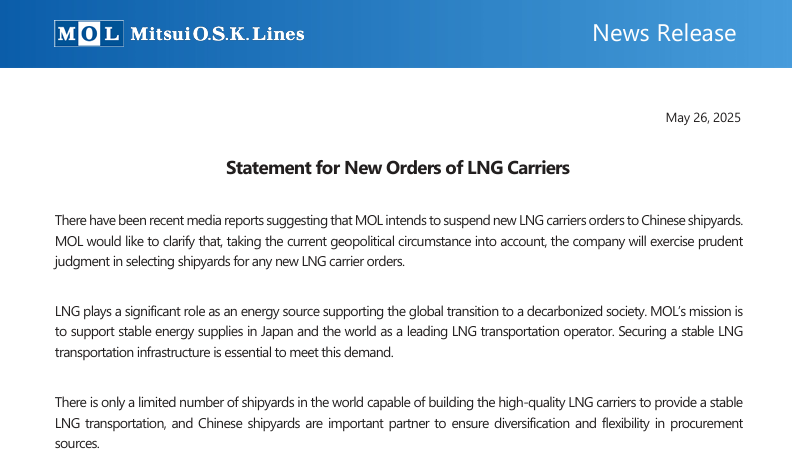The Nihon Keizai Shimbun has reported that Japanese shipping giant Mitsui O.S.K. Lines (MOL) will suspend new orders for LNG carriers from Chinese shipyards and will turn to South Korean yards. Based on the report, MOL executives revealed that “new commercial negotiations with Chinese shipyards will be put on hold for the time being and the six LNG carriers ordered from Chinese shipyards at the end of 2024 will not be released from their contracts.”
At the end of March 2025, MOL owned 107 LNG carriers, ranking first in the world, ahead of NYK Lines (89), which ranked second. By 2028, MOL plans to increase the number of LNG carriers to 140.
In response to recent media speculation, Mitsui O.S.K. Lines (MOL) has released an official statement regarding its LNG carrier procurement strategy. The Japanese shipping company clarified that while geopolitical factors are being carefully considered, it has not suspended orders with Chinese shipyards but will maintain prudent judgment in future shipyard selection.

The statement emphasized LNG’s crucial role in global decarbonization efforts and MOL’s commitment to ensuring stable energy supplies worldwide as a leading LNG transportation provider. The company stressed the importance of maintaining a reliable LNG shipping infrastructure to meet growing market demand.
Industry analysts note that with only a limited number of shipyards globally capable of constructing high-quality LNG carriers, Chinese yards remain important partners for ensuring supply chain diversification. However, shipping companies including MOL are reportedly monitoring several factors that could impact procurement decisions, particularly the U.S. government’s potential imposition of additional port fees on Chinese-built vessels.
According to the statement, MOL will continue evaluating both Chinese and South Korean shipyards that meet its stringent quality and safety requirements. The company indicated it will make future contracting decisions based on comprehensive assessments of evolving U.S. policies and geopolitical risks, while maintaining its focus on meeting global LNG transportation needs.
Market observers view this statement as MOL’s effort to balance operational requirements with increasing geopolitical complexities in the LNG shipping sector. The company reiterated its fundamental mission to support stable energy supplies through its LNG transportation operations.
On April 17, the Office of the U.S. Trade Representative (USTR) announced specific restrictive measures against China’s shipbuilding, maritime, and logistics following the 301 investigation, which would go into effect in October 2025 and increase annually. The restrictions primarily target Chinese shipowners and operators, Chinese-built vessels, and levies on non-U.S.-built motor carriers.
At the same time, the U.S. will restrict the transportation of LNG by foreign vessels and encourage the construction of LNG carriers in the U.S.. From 2028 to 2047, the proportion of LNG exported from the U.S. that needs to be exported by American vessels will gradually increase from 1% to 15%.
At present, MOL has not stopped its new shipbuilding cooperation with Chinese shipyards. On May 23, MOL ordered a 309,000 dwt LNG dual-fuel powered very large crude oil carrier (VLCC) from Dalian COSCO KHI Ship Engineering Co Ltd.(DACKS) under a long-term charter contract signed with Japanese shipowner Idemitsu Tanker, scheduled for delivery in 2027.


